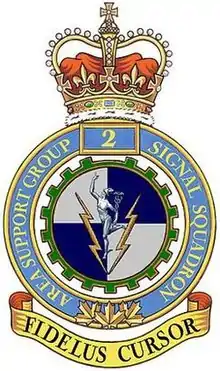| 2 Area Support Group Signal Squadron | |
|---|---|
 | |
| Active | 1998–2013 |
| Country | |
| Branch | Communications and Electronics Branch |
| Type | Communications |
| Role | To deliver secure and non-secure communication and information systems across LFCA. |
| Size | Approximately 60 soldiers (50 in regular force, 10 reserve force) and 100 civilian employees. |
| Part of | 2 ASG |
| Locations | Sqn HQ – CFB Petawawa A Tp – CFB Petawawa B Tp – CFB Kingston C Tp – ASU Toronto D Tp – ASU London Det Ottawa – Ottawa Det Nor On – Sault Ste. Marie |
| Motto(s) | Fidelus Cursor (Faithful Runner) |
| Colors | French grey and dark blue |
| March | The Mercury March |
2 Area Support Group Signal Squadron (2 ASG Sig Sqn) was a Regular Force Army unit within the Canadian Forces. The squadron was responsible for delivering secure and non-secure communication and information systems across Land Force Central Area (LFCA). The squadron's parent formation was 2 Area Support Group (2 ASG).[1] Although an Army unit, for service delivery the squadron aligned itself to an ITIL framework for business processes and a common lexicon with industry partners.
2 ASG Signal Squadron was headquartered at Canadian Forces Base (CFB) Petawawa with platoon-sized troops in Petawawa, Kingston, Toronto, London and section-sized detachments in Ottawa, Sault Ste Marie, and North Bay. The majority of soldiers within the squadron came from the Communications and Electronics Branch.[2] In 2013, 2 ASG Sig Sqn was renamed 4th Canadian Division Support Group Signal Squadron.[3]
History
2 ASG Sig Sqn, in various forms, has been located at CFB Petawawa since a school of signals was established in 1912. In 1960, Camp Petawawa Signal Squadron was formed from the amalgamation of three units: 2 Static Signal Troop, Camp Petawawa Signal Troop, and Increment D Troop. On 1 November 1966, Camp Petawawa Signal Squadron became 702 Communication Squadron (702 Comm Sqn) with the motto Nunquam Non Paratus (Never Unready).[4]
Over the years the squadron has changed hands between Army Signals, Communication Command, Director Information Services Organization and back to the Army. In 1998, 702 Communications Squadron became part of 2 ASG within Land Force Central Area (LFCA) and renamed to 2 Area Support Group Signal Squadron. Base Information Technology Support Units (BITSUs) at Ottawa, Kingston, Toronto, London, North Bay and Sault Ste. Marie were amalgamated with the squadron to create a single unit within LFCA, which would provide consolidated information systems support to all Army units in Ontario.[5] In 2013, 2 ASG Sig Sqn was renamed 4th Canadian Division Support Group Signal Squadron with a Government of Canada move to restore historical features of the Canadian Army.[6]
Commanding officers
- Lieutenant-Colonel Wayne Buck, CD, MSM (nato), 1998–2000
- Lieutenant-Colonel Paul Roy, CD, 2000–2002
- Major Luc Angiolini, CD, 2002–2004
- Major Ray Charlebois, CD, 2004–2006
- Major James Greengrass, CD, 2006–2008
- Major James Bronson, CD, 2008–2009
- Major Alex MacPherson, CD, 2009–2011
- Major Jason Smith, CD, 2011–2013
Squadron Sergeants Major
- Master Warrant Officer Theresa Charlton, CD, 2001–2005
- Master Warrant Officer Don MacIsaac, CD, 2005–2007
- Master Warrant Officer Rob Sheldrick, CD, 2007–2008
- Master Warrant Officer Allan Montgomery, CD, 2008–2010
- Master Warrant Officer Stephen McNabb, MMM, CD, 2010–2011
- Master Warrant Officer Al Trask, CD, 2011–2013
Armoury
| Site | Date(s) | Designated | Location | Description | Image |
|---|---|---|---|---|---|
| Denison Armoury 1 Yukon Lane | Canada's Register of Historic Places | Toronto, Ontario |
Large centrally located building houses 32 Canadian Brigade Group Headquarters; The Governor General's Horse Guards; 2 Intelligence Company; 32 Combat Engineer Regiment; 32 Service Battalion; 2 Military Police Regiment (Canada) and one of its sub-units, 32 Military Police Platoon; 4th Canadian Division Support Group Signal Squadron (formerly 2 Area Support Group Signal Squadron) Charlie Troop; 4th Canadian Division Support Group Detachment Toronto. |
||
See also
References
- ↑ "Link to Brigades – 2 ASG". Archived from the original on 15 April 2011. Retrieved 17 March 2011.
- ↑ "Branch Occupations – C & E Occupations". Archived from the original on 23 March 2011. Retrieved 17 March 2011.
- ↑ "TERMIUM Plus Search". Retrieved 7 December 2013.
- ↑ "702 Comm Sqn". Archived from the original on 6 July 2011. Retrieved 17 March 2011.
- ↑ "Canadian Forces Base Petawawa Directory & City Guide 2010–2011" (PDF). Archived from the original (PDF) on 6 July 2011. Retrieved 17 March 2011.
- ↑ "Canada restores historical features of the Canadian Army". Retrieved 7 December 2013.